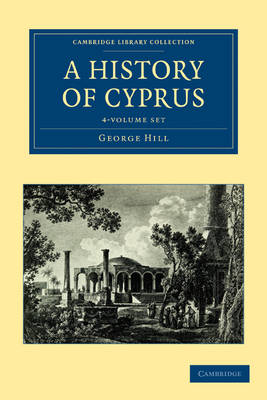Cambridge Library Collection - European History
4 primary works • 5 total works
Volume 1
A History of Cyprus: Volume 1, To the Conquest by Richard Lion Heart
by George Hill
Published 23 September 2010
Sir George Francis Hill (1867-1948) was perhaps best known as a numismatist, although his scholarly interests and accomplishments included a range of time periods and subjects. A classicist by training, Hill built his career at the British Museum's department of coins and medals. In his forty-three years there he produced volumes on coins of antiquity; Greek history and art; coins, heraldry, and iconography of medieval and Renaissance Italy; and treasure troves. In 1931 Hill became the Museum's director and principal librarian, the first archaeologist to hold this post. His four-volume History of Cyprus (1940-1952) ranged from Cyprus' earliest years to the twentieth century, and became the standard text on the subject. It is a valuable resource for scholars of the country, of antiquity and of the Mediterranean world. Volume 1 describes the land of Cyprus before unravelling its history from the Stone Age to the Crusades.
Volume 2
A History of Cyprus: Volume 2, The Frankish Period, 1192-1432
by George Hill
Published 23 September 2010
Sir George Francis Hill (1867-1948), was perhaps best known as a numismatist, although his scholarly interests and accomplishments included a range of time periods and subjects. A classicist by training, Hill built his career at the British Museum's department of coins and medals. In his forty-three years there he produced volumes on coins of antiquity; Greek history and art; coins, heraldry, and iconography of medieval and Renaissance Italy; and treasure troves. In 1931 Hill became the Museum's director and principal librarian, the first archaeologist to hold this post. His four-volume History of Cyprus (1940-52) ranged from Cyprus's earliest years to the twentieth century, and became the standard text on the subject. It is a valuable resource for scholars of the country, of antiquity and of the Mediterranean world. Volume 2 commences Hill's investigation of the Frankish period (1192-1432), which he continues in Volume 3.
Volume 3
A History of Cyprus: Volume 3, The Frankish Period, 1432-1571
by George Hill
Published 23 September 2010
Sir George Francis Hill (1867-1948), was perhaps best known as a numismatist, although his scholarly interests and accomplishments included a range of time periods and subjects. A classicist by training, Hill built his career at the British Museum's department of coins and medals. In his forty-three years there he produced volumes on coins of antiquity; Greek history and art; coins, heraldry, and iconography of medieval and Renaissance Italy; and treasure troves. In 1931 Hill became the Museum's director and principal librarian, the first archaeologist to hold this post. His four-volume History of Cyprus (1940-52) ranged from Cyprus's earliest years to the twentieth century, and became the standard text on the subject. It is a valuable resource for scholars of the country, of antiquity and of the Mediterranean world. Volume 3, organized largely around monarchical reigns, concludes Hill's analysis of the Frankish period (1432-1571).
Volume 4
A History of Cyprus: Volume 4, The Ottoman Province. The British Colony, 1571-1948
by George Hill
Published 23 September 2010
Sir George Francis Hill (1867-1948), was perhaps best known as a numismatist, although his scholarly interests and accomplishments included a range of time periods and subjects. A classicist by training, Hill built his career at the British Museum's department of coins and medals. In his forty-three years there he produced volumes on coins of antiquity; Greek history and art; coins, heraldry, and iconography of medieval and Renaissance Italy; and treasure troves. In 1931 Hill became the Museum's director and principal librarian, the first archaeologist to hold this post. His four-volume History of Cyprus (1940-52) ranged from Cyprus's earliest years to the twentieth century, and became the standard text on the subject. It is a valuable resource for scholars of the country, of antiquity and of the Mediterranean world. Volume 4 (1571-1948) reviews Ottoman rule, and and evaluates the then contemporary British presence in Cyprus.
Sir George Francis Hill (1867-1948), was perhaps best known as a numismatist, although his scholarly interests and accomplishments included a range of time periods and subjects. A classicist by training, Hill built his career at the British Museum's department of coins and medals. In his forty-three years there he produced volumes on coins of antiquity; Greek history and art; coins, heraldry, and iconography of medieval and Renaissance Italy; and treasure troves. In 1931 Hill became the Museum's director and principal librarian, the first archaeologist to hold this post. His four-volume History of Cyprus (1940-52) ranged from Cyprus's earliest years to the twentieth century, and became the standard text on the subject. It is a valuable resource for scholars of the country, of antiquity and of the Mediterranean world.

